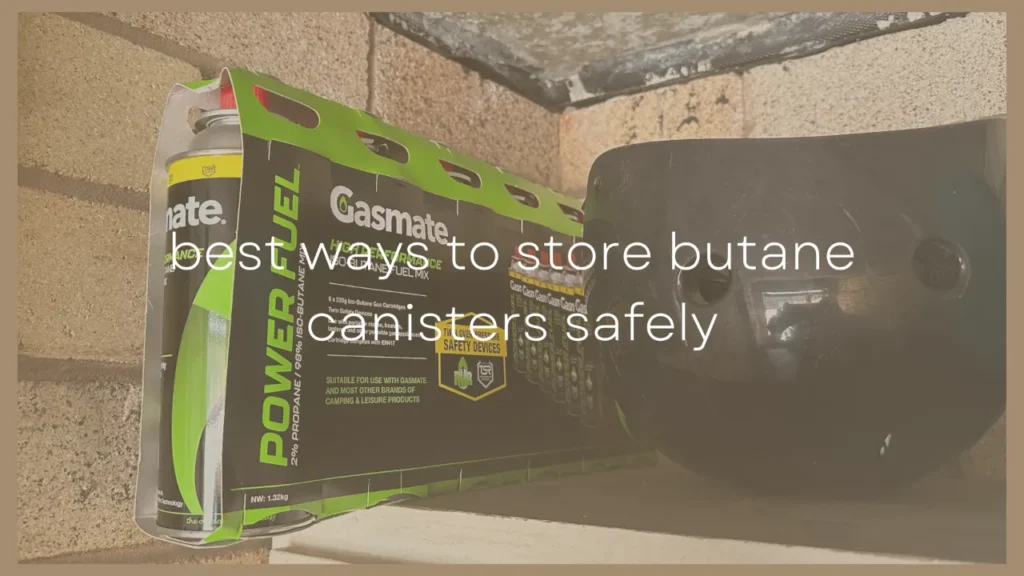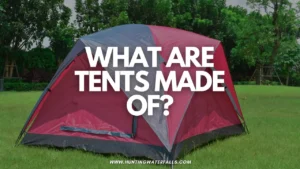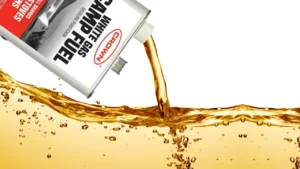I use butane canisters for my camping stove and heater and always bring a few spare canisters on my trips.
But constantly having what feels like mini explosives in my car, garage and house I figured it was important to learn how to store these butane cans safely (for years) so I never have to worry about any issues during storage, or when I go to use them.
Turns out these little cans are pretty robust and you only need to follow a few simple precautions to store them safely for years.
The best ways to store butane canisters safely is upright and in a cool, well-ventilated and dry place. Keep them away from electrical outlets, open flames and fire starting material and avoid storing them in garages. Store butane canisters in a box or shaded place while driving or hiking and never store them in your stove.
Storing butane canisters safely helps reduce the chances of an explosion or dangerous gas leak and also means that the cans will be safe, full and ready to use whenever you need them.
Following these steps I've been able to store old butane cans for years and have still felt confident using them on my camping trips.
1. Always Store Butane Canisters Upright
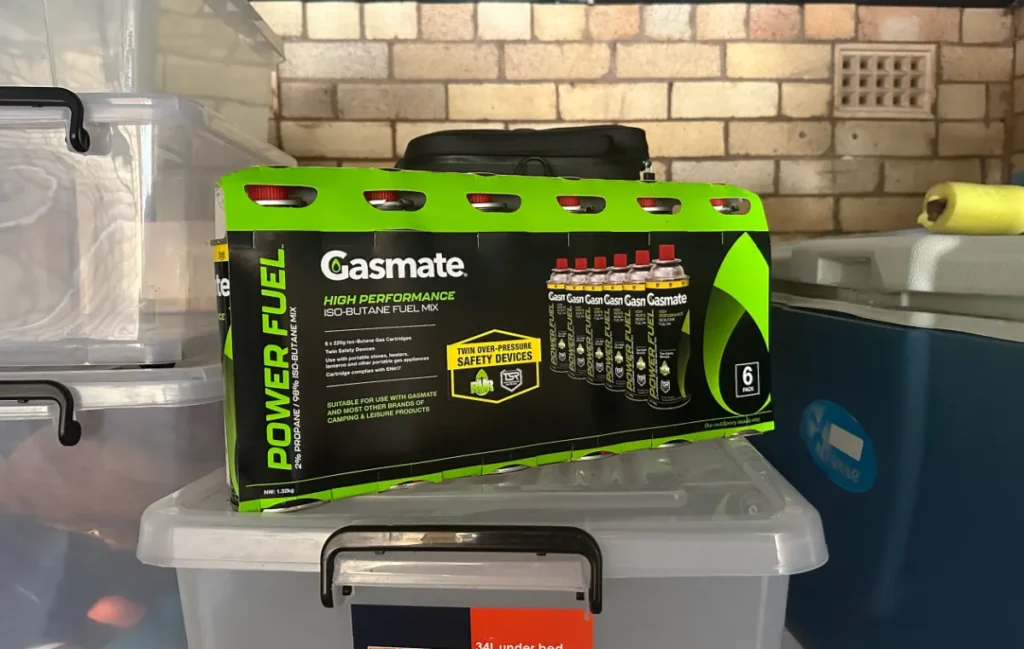
Storing butane canisters upright ensures that the gas is evenly distributed and doesn’t put excess pressure on the walls of the can (which is the area most likely to break).
Storing them on their sides or upside down can cause the gas to build up pressure along the walls, and eventually result in a potential explosion.
While the chance of this happening is still extremely small and requires some extreme conditions it's still better safe than sorry. So I always store my cans upright and in a plastic box so no weight is put in top of them.
2. Store In a Cool, Well-Ventilated and Dry Place
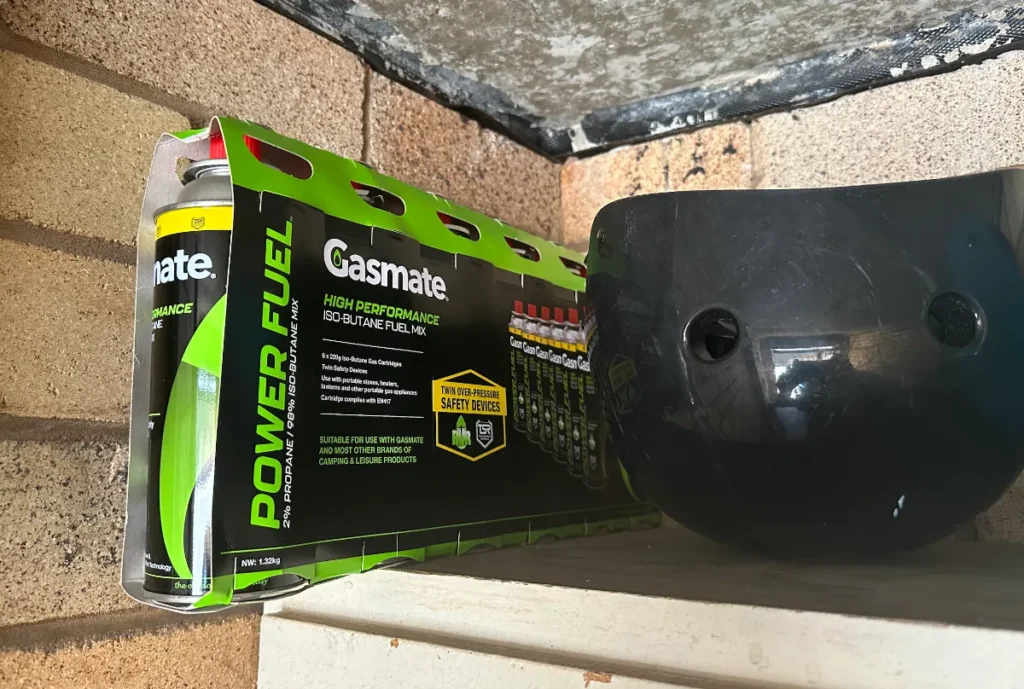
Butane should never be stored in direct or indirect sunlight and never in temperatures over 122°F (50°C). This can cause the butane to heat up and pressurize the canister’s walls, resulting in an explosion.
Again this is unlikely from direct sunlight alone but if outside and exposed to the elements rust can cause the deterioration of the can and when combined with high temperatures can lead to failures.
When camping or hiking in a hot area, store butane canisters in a box or backpack. You can also protect it from the sun by covering it with a light blanket or item of clothing. Just find a way to keep it in the shade wherever possible as to avoid those extremely high heats.
On the flip side, avoid storing butane below freezing point because it won’t be as effective. If you’re hiking or camping in a very cold area, consider wrapping the canister in a towel, warm blanket or thick sweater.
Storing butane canisters in a dry place is also important because continuous moisture exposure can corrode the container and cause a gas leak.
To keep your butane canister dry when camping or hiking, store it in a ziplock bag, which has the benefit of telling you if there’s a leak if it inflates.
Butane is a colorless and odorless gas and if your canister has a leak, you may not notice it. If you store your butane canisters in a poorly-ventilated area, the highly flammable gas will accumulate and could cause an explosion if there’s a spark or static electricity.
Given how small the cans are this is very unlikely to happen unless you have multiple cans leaking at a time.
3. Keep Away from Electrical Outlets and Open Flames
I think the open flame part goes without saying but keep your butane canisters away from open flames. The high heat combined with the flame CAN cause your butane canister to explode.
Check the video below to see exactly what can happen to your butane stove when it ends up in a fire. The explosion is pretty big for such a small can.
While keeping away from open flame is obvious it's also a good idea to keep it away from electrical outlets.
Butane is highly flammable and can quickly ignite if you store canisters near electrical outlets (which give off static electricity or sometimes small sparks).
The chance of this causing an explosion is rather small, but again when it comes to potentially explosive fuels it is better to be safe than sorry.
4. Avoid Storing Butane Canisters in a Hot Garage
Garages are convenient places for storing butane canisters but you should avoid storing them there because they’re usually not climate controlled and can get very hot in summer and cold in the winter.
Depending on your climate it may or may not be ok to store your butane canisters in your garage.
I live in a moderate climate and I live in a unit block where my garage never really gets too hot or too cold. It's also exposed to the open air regularly so gets good airflow.
But if you're in an area where you garage can get incredibly hot then this may not be the best place to store your butane.
What’s more, garages often have other flammable materials that can ignite if your butane canister has a leak.
The benefit of a garage though over your house is that if a leak or explosion does happen it's usually away from people and so while it may cause property damage it's less likely to cause human injury.
5. Keep the Canister Away from Fire Starting Material When Camping
If you’re planning on making a campfire or wood barbecue when camping, keep your butane canisters away from your fire starting material because a gas leak could cause the material to ignite.
Storing butane canisters close to lit flammable material is even worse due to the increase in temperature, which puts the canister at risk of exploding. If this happens, there will likely be a huge fire.
6. Store Them in a Cooler Place and Low Down When Driving
When transporting butane canisters in a car or campervan, try and find the coolest place in the vehicle that’s away from direct sunlight (this is often in a cabinet in your RV or on the floor inside your car as this is out of the sun).
I also try to keep the upright where possible when storing in my car or campervan but sometimes they fall on their sides and I haven't had any issues.
7. Never Store the Canister in Your Stove
This is something I'm definitely guilty of from time to time. I'll go camping, use my stove and then pack it away without taking the canister out. But this isn't a good idea.
Storing your butane canister in your stove can seem like a convenient storage place, especially when you’re trying to save space when camping. I mean it has a perfect spot for the canister.
However, since the canister is open, some of the butane gas could leak out, ignite and cause an explosion if the temperatures are high enough or there’s a spark or flame.
The one thing I did do correctly when storing it in my stove is to first disengage it from the stove so the can isn't open and feeding into the stove, but rather just sitting there in the canister spot. I did this when I was exploring the blue mountains and I only had a little bit of fuel left in my canister anyway.
This still isn't ideal, but it's better than leaving it engaged.
8. Store Butane Canisters Indoors
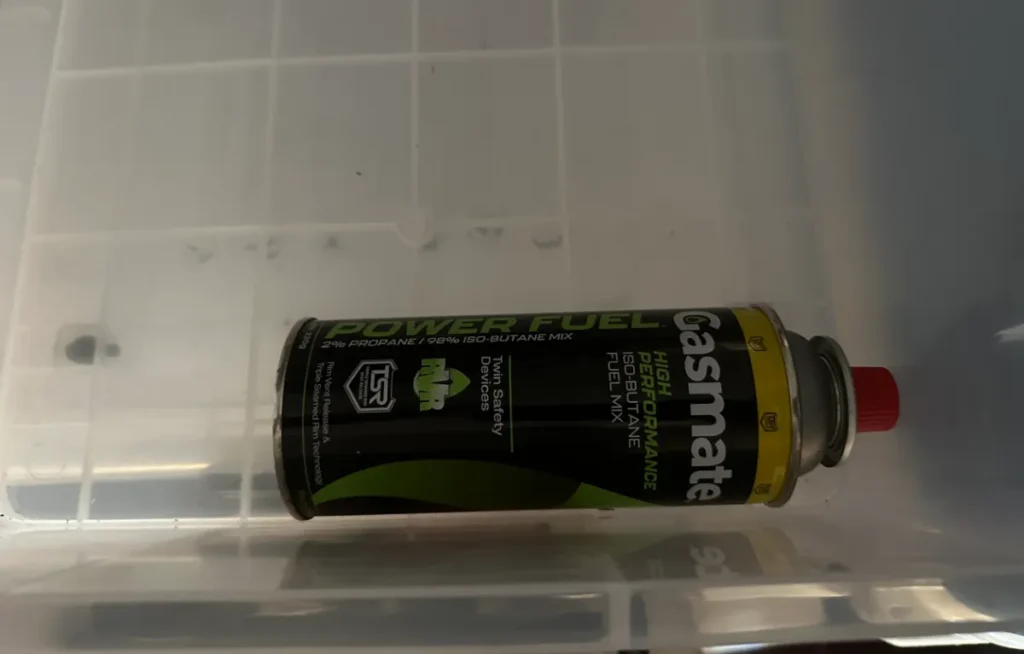
Although it’s discouraged to use butane stoves indoors (unless the area is very well-ventilated), you should store the canisters inside and not leave them outside and exposed to the sun, heat and the elements.
Storing them indoors is unlikely to expose them to extreme temperatures that can make the gas ineffective or at risk for pressurizing the canister’s walls.
Moisture from rain and snow can rust and damage butane canisters and cause leaks.
If you store yours in the kitchen, avoid storing them in a cabinet close to the stove or oven as this could cause the butane to heat up and pressurize the canister’s walls.

